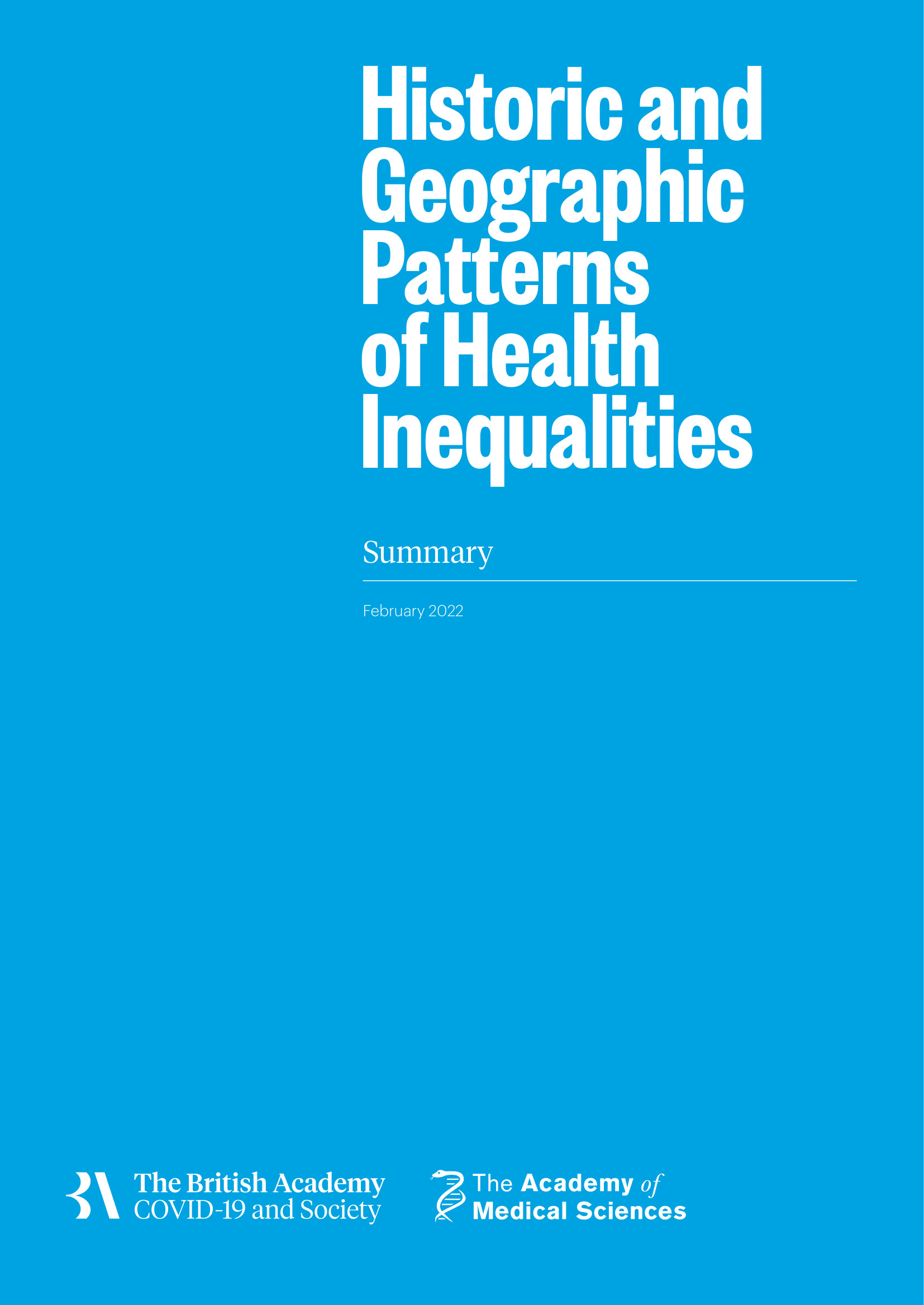Today the Academy of Medical Sciences and the British Academy publish a joint report outlining evidence that health inequalities both contribute to and derive from inequalities in life more broadly.
The Academy of Medical Sciences, the UK’s national academy representing the diversity of medical science, and The British Academy, the UK’s national academy for the humanities and social sciences were asked by the Scientific Advisory Group for Emergencies (SAGE) to explore the extent to which the impact of COVID-19 is distinguishable from place-based health outcomes over the past 200 years.
The report, ‘Historic and Geographic Patterns of Health Inequalities’, summarises points emerging from a roundtable discussion jointly hosted by the two national academies. These include:
- Improving health in deprived areas will mean policymakers must tackle the underlying social determinants of health.
- Analysis of evidence from places that have seen the greatest differences over time, especially in recent decades, is crucial to identifying factors that help places deal with ‘shocks to the system’ – factors such as community cohesion, supportive housing policies or access to green spaces.
- Public and patient participation in policymaking is vital to addressing patterns of health outcomes. Examples of this in action include the Wigan Deal and the Hartlepool Action Lab's Stronger Neighbourhoods projects, which targeted poverty as well as recognising and building on the strengths of local communities.
- The UK has some of the highest quality and largest quantity of datasets on health and inequalities, and policymakers could facilitate more data collection, better access to and linkages between datasets, as well as granting access of existing datasets to researchers from a wider range of disciplines through the Geospatial Data Strategy and other initiatives.
Professor Dame Theresa Marteau FMedSci FAcSS, Co-Chair of the joint roundtable and Director of the Behaviour and Health Research Unit, University of Cambridge, said:
“The COVID-19 pandemic has exposed and exacerbated pre-existing inequalities in health and life chances for those born and living in different parts of the UK.
“Halting and reversing these historic and geographical inequalities will require ambitious and sustained political action at local and national levels. This needs to build on extensive research conducted over the last century from across the humanities and sciences, designed together with local communities and robustly evaluated.”
Professor Dominic Abrams FBA, Co-Chair of the joint roundtable and Co-Chair of the British Academy’s COVID-19 – Shape the Future programme, said:
“The UK is facing a ‘COVID decade’ of societal impacts and the trajectory of the post-pandemic recovery will depend on targeting inequalities of all kinds. In this report, we talk about deprived areas and neglected communities, and we also consider inequalities of information and trust. Policymakers need to earn the trust of communities when making targeted interventions. Co-production of research and policy with public and patients is therefore essential, and this is supported by an extensive body of evidence.
“‘Levelling Up’ health divides has to involve a long-term national strategy to attract scientists and researchers to deprived regions. The UK needs research expertise from the SHAPE and STEM disciplines everywhere, to link up data capabilities and design policy interventions that suit the character of local areas and reflect the local communities’ perspectives.”
ENDS
CONTACT DETAILS
British Academy
Sean Canty – Press Officer
+44 (0)20 7969 5318
Academy of Medical Sciences
Gaby Richter – Media & News Officer
NOTES
- The Academy of Medical Sciences and The British Academy reviewed existing evidence and convened researchers from a wide range of disciplines, as well as policy specialists, patients, and public participants, for an independent roundtable discussion in Autumn 2021. The report summarises these discussions. The views summarised in this report are not necessarily representative of the participants nor individual Fellows of either Academy, but are commended as contributing to and enriching public debate and dialogue. While the initial request which led to this report came from the Scientific Advisory Group for Emergencies (SAGE) and while the work that underpins this report was part funded by a core grant from the Department for Business, Energy and Industrial Strategy (BEIS), it was carried out independently of Government.
- The Academy of Medical Sciences is the independent body in the UK representing the diversity of medical science. Our elected Fellows are the UK’s leading medical scientists from hospitals, academia, industry and the public service. Our mission is to advance biomedical and health research and its translation into benefits for society. We are working to secure a future in which:
- UK and global health is improved by the best research.
- The UK leads the world in biomedical and health research, and is renowned for the quality of its research outputs, talent and collaborations.
- Independent, high quality medical science advice informs the decisions that affect society.
- More people have a say in the future of health and research.
Our work focusses on four key objectives, promoting excellence, developing talented researchers, influencing research and policy and engaging patients, the public and professionals.
- The British Academy is the UK’s national academy for the humanities and social sciences. We mobilise these disciplines to understand the world and shape a brighter future. From artificial intelligence to climate change, from building prosperity to improving well-being – today’s complex challenges can only be resolved by deepening our insight into people, cultures and societies. We invest in researchers and projects across the UK and overseas, engage the public with fresh thinking and debates, and bring together scholars, government, business and civil society to influence policy for the benefit of everyone.
- The report will be published at the following URL:

